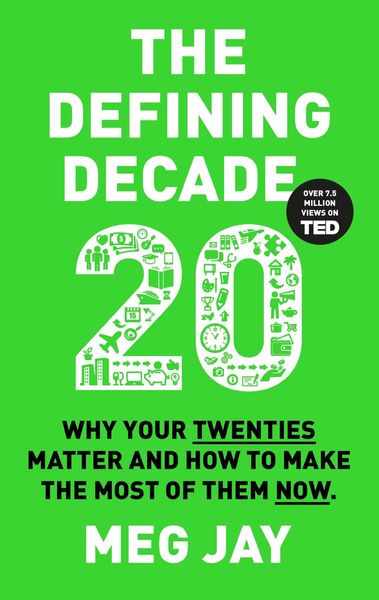
The Defining Decade Why Your Twenties Matter--And How to Make the Most of Them Now
New York Times bestselling psychologist Dr. Meg Jay uses real stories from real lives to provide smart, compassionate, and constructive advice about the crucial (and difficult) years we cannot afford to miss. Our "thirty-is-the-new-twenty" culture tells us the twentysomething years don't matter. Some say they are a second adolescence. Others call them an emerging adulthood. Dr. Meg Jay, a clinical psychologist, argues that twentysomethings have been caught in a swirl of hype and misinformation, much of which has trivialized what is actually the most defining decade of adulthood. Drawing from almost two decades of work with hundreds of clients and students, The Defining Decade weaves the latest science of the twentysomething years with the behind-closed-doors stories from twentysomethings, themselves. The result is a provocative read that provides the tools necessary to make the most of your twenties, and shows us how work, relationships, personality, social networks, identity, and even the brain can change more during this decade than at any other time in adulthood—if we use the time wisely. The Defining Decade is a smart, compassionate and constructive book about the years we cannot afford to miss.
Reviews
soph @sbruno25
Amb@amberariel
Emma@emmabutonline
Liyah 🤎@aallen1019
Monicap@insult_the_glory
Riley Bell@rikeyb
JoAnna@lilipuddingdog
Jack O‘Conner@miraluna
Zhomart M@zhomart
Xin Ma@xym
Lara Ximenes@laraximenes
Isabella@isabellareads
zubayr @zubayr
Bouke van der Bijl@bouk
Mitul Shah@ms
Anna Cordero@annagmc
Jowanza Joseph@josep2
Ivy X@poisonivayy
Julia@juliah
Eric@en
Alex bell@redlion8
Rebecca@bexx
Femke@motregen
Cindy@cindyy
Highlights
kata@katacaramel
𝓬𝓱𝓮𝓻𝓲𝓮@caffeineand
𝓬𝓱𝓮𝓻𝓲𝓮@caffeineand
Mitul Shah@ms
Mitul Shah@ms
Mitul Shah@ms
Mitul Shah@ms